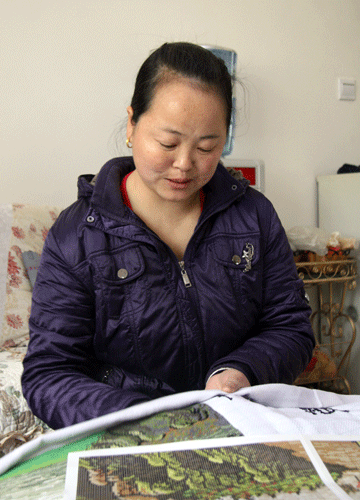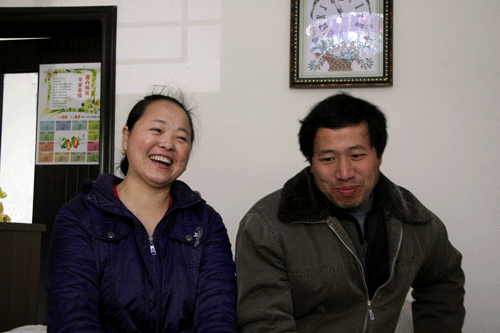Tears turn to smiles in village hit by Sichuan earthquake
Laojie ("old street") Village is just 7 miles north of Yingxiu Town, the epicenter of the 2008 Sichuan earthquake. Before the disaster, there were 418 households scattered along the ancient tea-horse road – the "old street" that has linked Sichuan with the Tibet-Qinghai Plateau for thousands of years. Most of the villagers depended on farming to make a living but the earthquake destroyed both their homes and their fields.
|
Xu works on embroidery to present to the government of Dongguan City which helped rebuild her village. [China.org.cn] |
Every one of the village's 598 buildings was either destroyed or severely damaged. A total of 55 people were killed and 78 were injured. At least half of the farmland was covered with boulders. The direct losses amounted to 50 million yuan. Indirect loses were incalculable. The tiny, quiet village was almost wiped from the map.
Troops from a nearby military base took the survivors to flat ground and helped them pitch tents. The villagers organized themselves. Men stood guard at night while women took care of the children and the elderly. Xu and some others were later sent to Chengdu on the army's boats. Xu's son and daughter walked for days from remote villages to look for her. Her husband was sent to Chengdu by his boss. Eventually the family was reunited at a temporary settlement site. "My mum looked very funny. She was carrying two huge bags, one on her back and one on her front. She had gathered up all our possessions from the ruins of our home," Xu's daughter Ma Lu said.
"I cried again when I arrived at the settlement site," Xu told China.org.cn. "The people in Chengdu had hung a banner saying 'welcome home brothers and sisters'. They gave us everything we needed, from toothbrushes to clothes. We were moved into newly built, empty apartments."
In January 2009, they began rebuilding with help from Dongguan, a modern industrial city in southeast China's Guangdong Province. Like the other villagers, Xu received 19,000 yuan from the central government, 12,000 yuan from the Dongguan government, and 3,000 yuan in donations from communists across China. The family took out a loan of 20,000 yuan and Xu sank 90,000 yuan of her savings into their new 106 square meter apartment. They moved in last October.
|
Xu Xingzhi (L) and her husband Ma Furun tell how they have rebuilt their lives after the 2008 Sichuan earthquake destroyed their home. [China.org.cn] |
Their new home is in a three-storey apartment block. The outer walls are decorated with traditional Tibetan and Qiang paintings. The new village has parking lots, a community center and a library built by Dongguan City. "Without them, we wouldn't be living comfortably in this new village. I can't speak Cantonese, so I am saying thank you in my own way," said Xu, pointing to some embroidery she is working on. She plans to present the embroidery to the Dongguan government in May, on the second anniversary of the earthquake.
The embroidery is not just a gift but a possible path to bright future for Xu. The village plans to develop tourism and Xu hopes to sell her handcrafts in shops and restaurants along the old tea-horse road. "I'm not sad any more. It was just a disaster and it's past now. I believe we can build a better life," Xu said, smiling.
 0
0 








